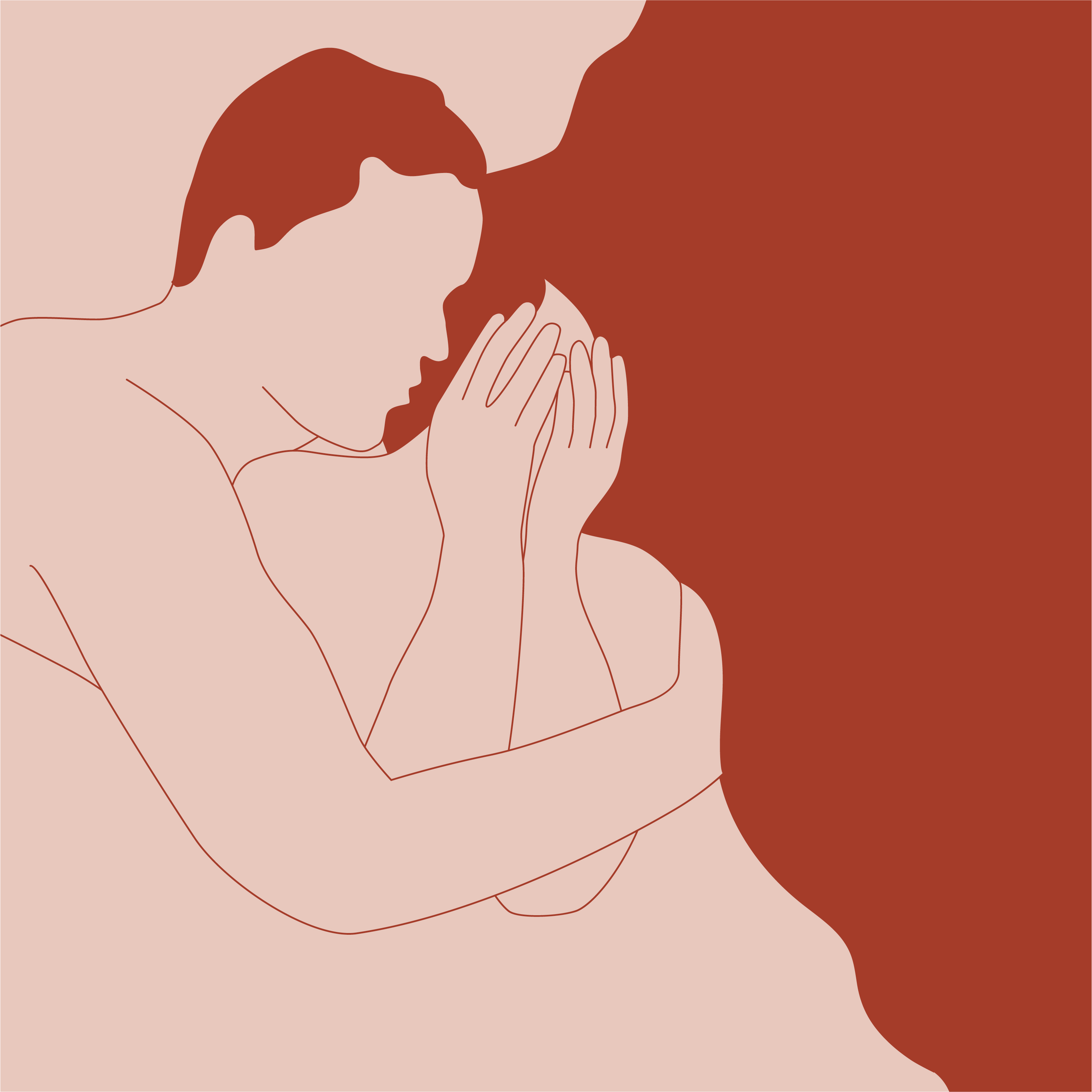Jun 18, 2025
OVULATION BLOATING: WHY IT HAPPENS AND HOW TO FIND RELIEF
You might be familiar with the bloating that often accompanies the days leading up to your period, but have you ever noticed a similar feeling of fullness or discomfort midway through your cycle? If so, you're experiencing ovulation bloating - a common but rarely discussed symptom that affects many menstruating individuals.
Understanding Ovulation Bloating
Ovulation typically occurs around day 14 of a 28-day menstrual cycle, though this timing can vary. During ovulation, your ovaries release a mature egg, which travels down the fallopian tube where it may potentially be fertilised. This process, while essential for reproduction, brings about hormonal fluctuations that can cause noticeable physical changes, including bloating.
Your body is orchestrating a delicate dance of hormones, and sometimes this symphony includes unexpected notes of discomfort.
The Hormonal Cascade Behind the Bloat
The bloating experienced during ovulation is primarily driven by hormonal changes, particularly:
- Oestrogen surge: In the days leading up to ovulation, oestrogen levels peak. Oestrogen can cause water and salt retention, leading to that uncomfortable full feeling in your abdomen.
- Luteinising Hormone (LH) spike: This hormone triggers the release of the egg from the ovary. The rapid increase in LH can affect fluid balance in your body, creating waves of change that ripple through your system.
- Progesterone rise: After ovulation, progesterone levels begin to increase. Progesterone can slow down digestion and cause gastrointestinal symptoms like bloating, gas, and constipation.
These hormonal shifts affect your body's fluid retention, digestive processes, and even how your abdominal muscles function, all contributing to that bloated sensation. Understanding this intricate choreography can help you move through it with greater ease.
How to Identify Ovulation Bloating
Ovulation bloating typically occurs around the middle of your menstrual cycle and may last anywhere from one to five days. Unlike menstrual bloating, which often comes with cramping and other premenstrual symptoms, ovulation bloating may be accompanied by:
- A feeling of fullness or pressure in the lower abdomen
- Mild pelvic pain or discomfort (sometimes called "mittelschmerz")
- Increased discharge
- A slight rise in basal body temperature
- Enhanced sense of smell or taste
- Changes in libido
Tracking these symptoms along with your cycle can help you confirm whether what you're experiencing is indeed related to ovulation. Think of it as learning your body's unique language.
Practical Tips to Manage Ovulation Bloating
While you can't prevent the hormonal changes that cause ovulation bloating, you can take steps to minimise discomfort and nurture yourself through this phase:
Dietary Adjustments
- Stay Hydrated: It might seem counterintuitive when you're feeling bloated, but drinking plenty of water helps flush excess sodium from your system and reduces water retention.
- Mindful Eating: During ovulation, consider reducing foods that contribute to bloating, such as:
- High-sodium processed foods
- Carbonated beverages
- Gas-producing vegetables like broccoli, cabbage, and beans
- Dairy products (if you're sensitive)
- Artificial sweeteners
- Anti-Inflammatory Foods: Incorporate foods that may help reduce inflammation and bloating:
- Potassium-rich foods like bananas and avocados that balance sodium levels
- Ginger and turmeric for their natural anti-inflammatory properties
- Pineapple, which contains bromelain, an enzyme that aids digestion
- Yoghurt with live cultures to support gut health
Lifestyle Modifications
● Gentle Movement: Light exercise like walking, swimming, or yoga can stimulate digestion and help release trapped gas. Specific yoga poses like Child's Pose, Happy Baby, and supine twists can be particularly effective for relieving bloating. Movement becomes medicine for your body.
● Stress Management: Stress can exacerbate hormonal fluctuations and digestive issues. Practices like meditation, deep breathing exercises, or gentle stretching can help manage stress during ovulation.
● Suitable Clothing: Opt for comfortable, non-restrictive clothing during these days to avoid additional pressure on your abdomen. Choose pieces that move with you rather than against you.
● Heat Therapy: A warm bath or heating pad can relax abdominal muscles and provide comfort during bloating, wrapping you in gentle relief.
Natural Remedies
- Herbal Teas: Certain herbal teas may help alleviate bloating:
- Peppermint tea for its antispasmodic properties
- Ginger tea to aid digestion
- Fennel or caraway tea to reduce gas
- Essential Oils: Some find relief with essential oils like peppermint or lavender, either diffused or diluted in a carrier oil for gentle abdominal massage.
When to Consult a Healthcare Provider
While ovulation bloating is typically normal, sometimes it can signal underlying issues that need attention. Consider consulting your GP if you experience:
- Severe bloating that significantly impacts your daily activities
- Intense pain accompanying bloating
- Bloating that doesn't subside after ovulation
- Bloating accompanied by unusual symptoms like fever or vomiting
- Consistent bloating throughout your cycle rather than just around ovulation
These symptoms could indicate conditions like endometriosis, ovarian cysts, or irritable bowel syndrome that may require medical intervention.
Embracing Body Awareness
Understanding the pattern of your body's response to hormonal fluctuations throughout your cycle is empowering. By tracking your symptoms, you can better prepare for and manage ovulation bloating when it occurs. Many cycle tracking apps allow you to note symptoms like bloating alongside your period dates, providing valuable insights into your personal pattern.
This awareness becomes a form of self-care, helping you implement targeted strategies precisely when you need them most.
The Bigger Picture
Remember that cyclical changes, including temporary bloating, are part of your body's natural rhythms. Rather than seeing ovulation bloating as merely an inconvenience, consider it as one of many signs that your reproductive system is functioning as designed.
By understanding what's happening in your body during ovulation and implementing gentle self-care practices, you can navigate this phase of your cycle with greater comfort and confidence. Listen to your body's needs, adjust accordingly, and remember that the discomfort is temporary - a new phase of your cycle is always just around the corner.
Each cycle offers an opportunity to deepen your understanding of your body's wisdom.
Anything else? Essity Australasia makes no warranties or representations regarding the completeness or accuracy of the information. This information should be used only as a guide and should not be relied upon as a substitute for professional, medical or other health professional advice.
Blogs

Jun 08, 2022
EXPLORING PERIOD CARE IN CULTURES AROUND THE WORLD
Our TOM Talks panelist Sabina McKenna explores how different cultures around the world approach period care.
Read More
Jun 08, 2022
STOP APOLOGISING FOR HAVING YOUR PERIOD
Our TOM Talks panelist Mel Mason talks about the importance of not apologising for having your period.
Read More
Jun 07, 2022
STRESSED? NOT SLEEPING? TRYING TO CONCEIVE?
TOM Talk's panelist Georgia Hartmann discussed the links between stress, sleep and fertility.
Read More
Jun 07, 2022
STRESS AND HOW IT AFFECTS YOUR SEX DRIVE
Certified sex coach Georgia Grace is here to unpack the link between stress and sex.
Read More
